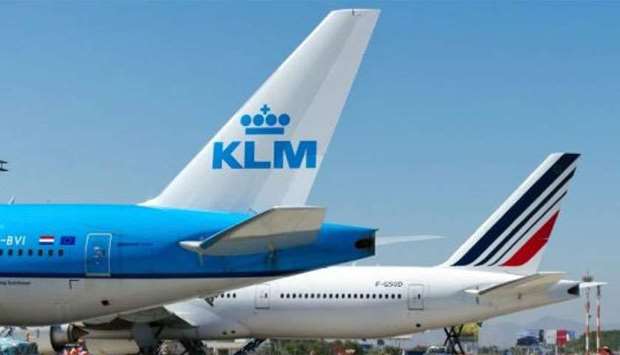* New CEO Ben Smith seeks new savings
* Shares fall on weak unit-revenue outlook
* Fuel bill seen increasing by 650 mn euros
Air France-KLM pledged new efficiency gains to offset higher fuel costs this year, as the airline deepens cooperation between its two main carriers.
The Franco-Dutch group's fourth-quarter earnings before interest, tax, depreciation and amortisation (EBITDA) fell 20 pct to 776 million euros ($880 million) as its fuel bill mounted, despite a 4.1 percent revenue gain to 6.54 billion.
Air France-KLM shares were down 3 percent at 0818 GMT, after it said unit revenue fell 0.6 percent in the last three months of 2018 and would decline further in the current quarter.
But Chief Executive Ben Smith, who joined in September, promised better-coordinated networks and fleets, after overcoming KLM resistance to closer integration.
‘These first achievements pave the way for our ambition to regain a leading position in Europe and worldwide,’ Smith said in a statement.
Blighted by restrictive French union deals and strikes that last year wiped 335 million euros off earnings and forced out its previous CEO, Air France-KLM has trailed rivals Lufthansa and British Airways on profitability.
But Smith, an Air Canada veteran, has restored labour peace by granting wage hikes in return for increased flexibility with which he now hopes to make better and more profitable use of the group's aircraft and networks.
On the eve of the results, Air France-KLM struck a new pay deal with its French pilots and resolved a standoff with KLM and the Dutch division's popular leader Pieter Elbers, over Smith's integration plans.
Wariness on the Dutch side is partly explained by the relative underperformance of Air France - whose 2018 operating margin was 1.7 percent, compared with 9.8 percent for KLM.
Almost 15 years after the Air France-KLM merger, decisions on networks, fleets and commercial strategy will now be taken by the group rather than the individual carriers, under the plans unveiled on Tuesday - which also see Elbers and Air France counterpart Anne Rigail become deputy group CEOs.
The financials were broadly in line with expectations of 786 million euros of EBITDA on 6.52 billion in revenue - based on the median of seven analyst estimates in a poll by Infront Data.
‘While a new CEO with an impressive track record has been appointed and short-term pay deals agreed with the French unions, we await details of his new strategy,’ Liberum analysts said in a note, voicing concern over ‘a deteriorating unit revenue trend against a backdrop of higher fuel prices’.
The fuel bill rose by 451 million euros in 2018 and will climb another 650 million this year as hedges expire, Chief Financial Officer Frederic Gagey told reporters on a call.
Overall unit costs, up 0.6 percent last year before currency and fuel-price impacts, were ‘well under control’, Gagey said. While unit revenue will likely decline in the first quarter, due in part to a later Easter holiday in 2019, summer bookings are ‘better positioned’ than a year ago, he said.
The group said 2019 costs are expected to come in somewhere between flat and a 1 percent decline, on the same basis.
Passenger traffic rose 3.4 pct to 24.46 million in the last quarter, the group said, while crossing the 100 million threshold for the full year.
The low-cost Transavia arm was a bright spot, posting a 9 percent 2018 operating margin for its French operations as it prepares to expand capacity by 9-11 percent in 2019, while overall group capacity expands a more modest 2-3 percent.
The new labour details should provide a financial lift in 2019, the CFO said, avoiding the strikes and disruption that led to a spike in Air France's customer compensation bill last year.
The rollout of new digital sales platforms will also generate savings, along with improvements to long-haul network planning and the gradual replacement of less fuel-efficient four-engined Airbus A340 and Boeing 747 planes.
The newly-announced management changes may boost efforts to increase synergies in areas such as purchasing - which lacked a single group-wide chief procurement officer until last year.
Smith's centralisation push builds on years of painstaking integration that had already assigned some 18,000 staff to group-wide services and managers, said Gagey, who joined Air France in 1997.
‘It's not as if we just realised we should begin to look for synergies,’ he said.

